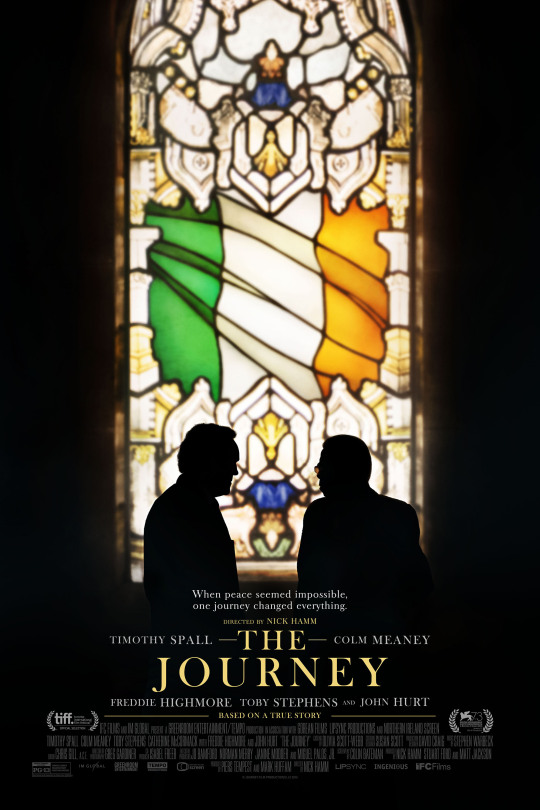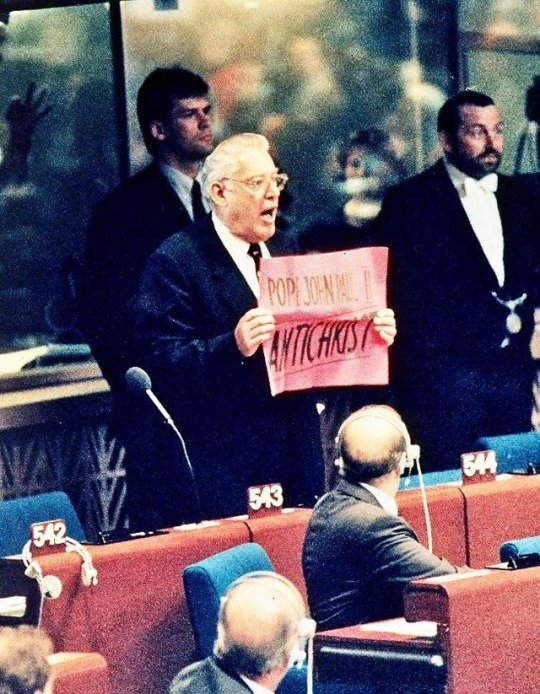#ian paisley
Text
I am beginning a "song of the day" thing because I'm gangster, I roll to my own beat, I make my own rules.
Today's song of the day is Sold Out by Young Lean and Blade.
It truly pains me to say that this album and specifically this tune is the best thing I've heard from this year. Just some genuine feel good hits of the summer (in spring). Some job folks.
#song of the day#ru hits of the lifetime#who is ru and what do they do#ian paisley#jimbo#sammy wilson#spotify#yung lean#bladee#drain gang#sadboys#i wish it was still 2013 and life wasnt so sad but i suppose I'll just have to make do with my current reality despite my hesitiations#vote biden
7 notes
·
View notes
Text
#OTD in 1948 – Birth of Gerry Adams in Belfast.
Gerry Adams, born in Belfast, former president of Sinn Féin, was one of the chief architects of Sinn Féin’s shift to a policy of seeking a peaceful settlement to sectarian violence in Northern Ireland. He was elected several times to the British House of Commons for Belfast West, however, following party policy, did not take his seat. He represented Belfast West (1998–2010) in the Northern…

View On WordPress
#Belfast#Belfast Agreement#Belfast Brigade#Belfast West#Brendan &039;The Darkie&039; Hughes#British House of Commons#Dolours Price#Gerard &039;Gerry&039; Adams#Good Friday Agreement#Ian Paisley#Irish Republican Army#Martin McGuinness#Provisional Irish Republican Army#Sinn Fein#Stormont#Taoiseach Enda Kenny#The Missing
12 notes
·
View notes
Text

#the journey#timothy spall#colm meaney#movie poster#movie posters#martin mcguinness#ian paisley#freddie highmore#john hurt#toby stephens#ian mcelhinney#barry ward
2 notes
·
View notes
Text
Ian Paisley: A True Inspiration for Faith and Truth.
Introduction:
In the realm of faith and truth, there are individuals whose unwavering commitment and steadfast principles leave an indelible mark on history. One such luminary figure is Ian Paisley, a charismatic preacher, politician, and fervent advocate for his beliefs. His life's journey is a testament to the power of conviction and the impact one person can have on the world.

The Early Years:
Born on April 6, 1926, in Armagh, Northern Ireland, Ian Richard Kyle Paisley grew up in a deeply religious family. His father, a Baptist minister, instilled in him a strong sense of faith from a young age. This early exposure to the teachings of Christianity laid the foundation for Paisley's life-long dedication to his religious convictions.

The Pulpit and Evangelism:
Paisley gained recognition as a dynamic and fiery preacher, captivating audiences with his passionate sermons. His eloquence and fervor attracted a large following, earning him a reputation as a charismatic leader within the Protestant community. Throughout the 1950s and 1960s, Paisley's influence extended beyond the pulpit as he championed traditional Christian values and opposed what he perceived as compromising influences in society.
Political Stature:
Ian Paisley's impact on Northern Ireland's political landscape cannot be overstated. In 1971, he founded the Democratic Unionist Party (DUP), a political force that would go on to play a significant role in the country's turbulent history. His staunch opposition to any compromise with Irish republicanism earned him both staunch supporters and vehement critics.

Paisley and the Troubles:
The Troubles, a period of intense conflict in Northern Ireland from the late 1960s to the late 1990s, tested the resolve of its people and leaders. Paisley, during this tumultuous era, remained unyielding in his commitment to his beliefs. While some viewed him as a polarizing figure, others saw him as a defender of Protestant identity and a bulwark against perceived threats.

The Power of Faith:
Ian Paisley's life exemplifies the power of faith to shape an individual's character and actions. His unwavering commitment to his religious beliefs, as well as his political convictions, sets him apart as a figure who stayed true to his principles even in the face of adversity.
Legacy:
Ian Paisley passed away on September 12, 2014, leaving behind a complex legacy. His life serves as a reminder that individuals can profoundly influence the course of history when driven by genuine conviction. Whether one agrees or disagrees with his views, there is no denying the impact he had on the religious and political landscape of Northern Ireland.

Conclusion:
Ian Paisley's life is a compelling narrative of faith, conviction, and resilience. As we reflect on his legacy, it is essential to appreciate the role he played in shaping the destiny of Northern Ireland and recognise the enduring impact of his unwavering commitment to faith and truth.
#Ian Paisley#Faith#Truth#Christian Leadership#Northern Ireland#Democratic Unionist Party (DUP)#Evangelism#Protestantism#The Troubles#Political Legacy#Religious Convictions#Pulpit Power#Charismatic Preacher#Irish Politics#Protestant Identity#Conviction#Legacy#Christian Values#Inspirational Figure#Faithful Leadership#today on tumblr
5 notes
·
View notes
Text
Zhuang Zhou vs. Ian Paisley: On the Absolute Complicity Between Power and Irreverence
What is the relation between irreverence and Power? Perhaps the Zhuangzi inadvertently provides a skeleton key—the reader’s dream of laughing at Power? Power’s laughter of dreaming the reader? An unspeakable taboo, a forbidden chiasmus, is put, no doubt derisively, under the reader’s nose. “Zhou and a butterfly—surely there is a division”. The phrase following the famous affirmation of ambiguity in the butterfly dream passage is, conversely, sacred. That even grammar itself seems to resist the chiasmus is very telling. Divisively, there is certainty? Not quite. The phrase is unutterable proper, precisely because it betrays the secret of certainty and the secret of division, which is that their secrets are one and the same. A Continental’s pretense of not being orientalist? An orientalist’s pretense of not being Continental? The butterfly, of course, in strict—Mathematical—opposition to its “poetic” allusions, is absolutely necessary here: is the incestuous secret not akin to the Devil’s Tuning Fork in that the Geometric body is coherent not despite but precisely because of its division? Likewise, is the same secret not akin to the oneiric “spatiotemporal” body? Finally, are the Fork and the dream not akin to the Continental Symbolic and Imaginary (it is totally irrelevant which is which), themselves writhing into being on either side of the incestuous body of the Continental Real—the literal bodily “metamorphosis” of the butterfly? There is another forbidden chiasmus which, of course, totally colludes with the first one, the second sacred phrase of “things changing”. That, indeed, “change thinging” is unutterable for the “other” reason, for simply being synonymous with base Materialism (i.e. “motion producing”) is nothing short of Demonic. Just as Demonic as literal butterflies changing precisely into living fodder for the same caterpillars: the butterfly eggs shed the butterfly’s body just as the butterfly’s body sheds the pupal case—even Biologically speaking, this abominable “spatiotemporal” body can be indefinitely traversed from one end to the other…“Where their worm dieth not, and the fire is not quenched”. Conversely, Ian Paisley says:
Last of all, let us note the content of what it says. It says “it is the Blood of sprinkling.” Those are wonderful words “the Blood of sprinkling.” There are three great instances in which the Blood was sprinkled. Go back to the Passover night. The Israelites were told to take the basin of the shed blood. They were told to take hyssop and sprinkle the blood upon the lintel and the sideposts of the door, the entrance to the house. There is a word used there that is used nowhere else about the blood. It does not say “sprinkled,” although it was sprinkled. It says, “Strike the doorpost!” “Strike the lintel!” Thank God that is what the Blood of Jesus did for me. It struck the lintels of the posts of Heaven. It struck the doorposts of glory. When it struck them, the door opened for me, and praise God, I walked in sheltered under the Blood of the Lamb. I believe there is Striking Power in the Precious Blood of Christ. What a day when the Blood struck your heart, brother. What a day that was, when God saved us by His Son’s Blood.
In contrast to the Continental-orientalist metamorphosis (commonly known as Catholicism), Calvinists cannot help but affirm the most dangerous Gnosticism—a catastrophic waking—precisely because they take orthodoxy, rather than irreverence, to the end. Catholic logorrhea about the “meaning” of the blood puts the literal and the figurative in a Zhuangzian relation, that is to say, it constitutes the IRREVERENCE OF POWER. The Catholic claims the murderous actuality of the blood to be a premise for an all but literal joke (milk, menstrual blood, intoxicants, etc.); the Devil’s Tuning Fork buzzing with the derision of Power. Whereas the Calvinist-Gnostic (Black Gnostic) steps on the pupa and witnesses the abominable substance therein. Indeed, a “regressive” Christology, one that looks for anti-metaphors in the Old Testament, lends the blood a different sameness, a proper striking power: it is precisely there that a total destitution, a total depravity of the Father himself, puts the “general exchange” (between Zhou and the butterfly) of the blood to death. It is precisely there that the aforementioned irreverent substances putrefy the blood into catastrophic venom.
Another bestial passage in the Zhuangzi, about a turtle, pertains to life and death. Curiously, Zhou concluding with affirming base life is not unlike Continental affirmation of the same base life, so much so that one could perform a short circuit between the passage itself and the Continental blueprint of “absent centers” engendering life itself. That the dead turtle is described as a literal absent center of a great multiplicity is not even one step removed from current Hegelianism, it simply is it, that Zhou does not mention a hypothetical living turtle, but the dead turtle itself being hypothetically alive—all of this “changes things”: life itself becomes hypothetical, rather than muddy (i.e. classically Material), an occult emanation from the temple of Power. That the two officials answer Zhou’s “own” question for him is an all but explicit disclosure that Power accounts for irreverence by simply being proactively irreverent. Conversely, Ian Paisley says:
In that summons is the fearsome condensing of the three hours of darkness when Christ went into the very eye of God’s awful storm of wrath upon sin—when He endured such affliction that had He not been Omnipotent He would have died the victim and not the victor—the agony which brought from the heart of the Sufferer that mysterious cry, “My God, My God, why hast Thou forsaken me!”
Therefore, the foreshortening of the dead and living bodies is an almost literal refusal to laugh at the joke of vivifying. In fact, Zhou himself can be regarded as precisely this, a homunculus or imp—irreverence itself—administering the realm of Power. Indeed, this is not so much uncharacteristic of orientalism, but covertly characteristic, exactly as orientalism itself is likewise covertly characteristic of Continentalism. Their transubstantiation being not unlike that between the two bestial bodies. In this sense, banishing the Zhou “opens” the space of Gnostic interiority which is where the incestuous contiguity of the two bestial bodies is realized (talk about “Alchemy”!). Golgotha is the very superposition of the ancestral temple and the mud: the eye of God’s awful storm of wrath upon sin is there only to forgive himself. The forbidden operation of all orthodoxy is precisely this: “synthesizing” the “two” holes of the cylinder into “one”.
A third bestial passage, about an ox, pertains to something and nothing. Conversely, there is an “anti-opposition”, so to speak, between the passage and the Gnostic position. Ian Paisley says:
WHAT WAS THE REAL VEIL?
But this of course is a type.
What was the real veil? The real veil was the flesh of the Lord Jesus. If you turn over to the book of Hebrews chapter 10:19, It says “Having therefore boldness to enter into the holiest,” you don’t need to worry, you can be bold to enter in. You don’t need to hang your head and try to sneak in, there is no sneaking-in needed. The barricade is away, completely removed, so you walk in with boldness to the throne of grace. “By a new and living way.” What is that way? The blood of Jesus. How did He consecrate that way? By the veil, that is to say His flesh. His flesh was the veil. That is most interesting. His flesh, His body, His humanity, was that veil.
You know, if you turn in your Testament to Matthew’s Gospel 27, you will find something preceded the rending of that veil. You will find there the story of the cross. You will find there the story of those who parted His garments. Verse 34 “They gave him vinegar to drink mingled with gall; and when he had tasted thereof, he would not drink. And they crucified him, and parted his garments, casting lots; that it might be fulfilled which was spoken by the prophet, They parted my garments among them and upon my vesture did they cast lots.” Then if you go on through the reading you will find that there was one garment they did not part and that was His robe. They did not tear it asunder. What was that robe? It was the robe that covered the body of Christ as He walked on this earth. Behind that robe was the sinless humanity of the Son of God, and no man could tear one rent in the covering of the sinless body of the Son of God, but on the cross the veil was rent from top to bottom.
Last night, as I was studying this text I discovered that the first blows that fell on Christ in punishment were blows upon His head. Rending the veil, the flesh, from the top to the bottom. Before they spiked His feet they had already crowned His head with thorns. Before they spiked His feet they had already torn the hairs from off His face. Before they spiked His feet they had already beaten Him on the head and spat upon Him. The veil rent from the top to the bottom! It is in the rending of that veil that we have a way into the Holiest of all.
Of course, the Zhuangzi passage begins with a master admiring a servant, this textbook perversity rather compromises whatever “Metaphysical” wealth is purportedly prepared therefrom. That the knife does not encounter the ox and vice versa maps onto the blueprint of master and servant (Power and irreverence) “not encountering each other” or, more properly speaking, disappearing into the nuptial chamber and becoming one flesh—something proactively done by Power itself. It is no coincidence that flesh itself is thereby condemned to this absolute suspension in a matrix of interstices, the intersection of lines being as the undue contiguity of Power or irreverence, this time of something and nothing. Paisley affirms a kind of “schizosomia”, a body, or bodily violation, showing through or—why not?—peering through the innocuous foliage of the vulgar body, the “anti-irreverent” unwanted answer of what happened to the ox, Metaphysically speaking. The Zhuangzi passage concerns the servant’s chamber and servant’s work, Paisley enters the master’s chamber and forcefully feeds him the ox. Is the lamb-lion transfiguration not something like a “schizoagnia”? This total bodily violation, not to mention bestialization, smashes the Holy of Holies—total destitution.
#yaldabaoth#gnosis#gnosticism#demiurge#baudrillard#ian paisley#zhuangzi#zhuang zhou#have paragraphs for once
2 notes
·
View notes
Video
youtube
Revival Possible and Actual - Ian Paisley
#youtube#god#jesus#revival#prayer#ian paisley#revival possible and actual#christianity#bible in a year#change your thoughts#change yourself
1 note
·
View note
Text
DUP only damaging itself through desire to shift the goalposts on Irish unity
Ian Paisley’s fantasy legislation only continues party’s trend of weakening the Union as perception grows that reunification is looking more likelyBelfast artist Brian John Spencer’s take on DUP MP Ian Paisley’s suggestion of a border poll supermajority billThe most compelling reason to believe that Irish unity might happen is not that nationalists are likely to win a border poll, but that a…
View On WordPress
#(un)Democratic Unionist Party#DUP#Gerry Adams#Ian Óg#Ian Paisley#SDLP#Sinn Féin#UVF mouthpiece Jamie Bryson
0 notes
Text
This is one of the foreign fighters who just got captured in Ukraine.
It's interesting that his church would help him. The church in question is a member of the Free Presbyterian Church of North America. Said denomination split off from Ian Paisley's FPC (Ulster).
Those of my followers from the UK may be more familiar with Paisley and his beliefs.
1 note
·
View note
Text

At the opening of the Bob Jones Seminary building, there's David Innes of Hamilton Square Baptist, Richard Rupp of the BJU Faculty, Ian Paisley, and Mrs. Fannie May Holmes Jones herself.
0 notes
Text
History tends to repeat itself in general but also I feel very strongly that specifically politicians seem to have a pathological aversion to learning anything from the past ever
#posts that are about the gordon riots vs northern ireland in the 60s#edit actually why the fuck am I not naming names. I hope Lord George Gordon & Ian Paisley are both burning in hell together#history#jory.txt
154 notes
·
View notes
Text
Today's song of the day annoys me to death, it annoys me that somebody could write something like this, it annoys me that he proceeded to write fifty songs better than it, it annoys me that he existed, it annoys me that he was french. Shake my damn head.
#ru hits of the lifetime#who is ru and what do they do#song of the day#ian paisley#arlene foster#the mail regiment of the inla#italy? more like doesntaly! haha#Spotify
1 note
·
View note
Text
#OTD in Irish History | 28 September:
1678 – ‘Popish plot’ is alleged in England. The Popish Plot was a fictitious conspiracy concocted by Titus Oates that gripped England in anti-Catholic hysteria between 1678 and 1681. Oates alleged that there existed an extensive Catholic conspiracy to assassinate Charles II, accusations that led to the execution of at least 15 men and precipitated the Exclusion Bill Crisis. Eventually Oates’…

View On WordPress
#irelandinspires#irishhistory#OTD#28 September#History#History of Ireland#Home Rule#Ian Paisley#Ireland#Irish Civil War#Irish History#Irish War of Independence#Painter#Popish Plot#Seán Keating#Today in Irish History#Ulster
19 notes
·
View notes
Text
.
#im watching hockey and have just been flabbergasted about an ad about 'our catholic faith'#literally heard those words and it was like ian paisley himself possessed me#you can't advertise that!!!!!!#it was for healthcare too like what you turn the protestants away????#between that and the diabetes medicine ad that can ruin your pancreas
7 notes
·
View notes
Text
I am so glad I don't dabble in historical hetalia/hetaverse in general anymore and that Soph can be Soph. Even writing Canon N.Ire would do my head in. All I got after extensive familiarization with the history is that they rightfully would want nothing to do with no one.
#beablabbers#it's such a complicated topic beyond the British Army and general involvement#anyways I also hope that Ian Paisley rots in hell for all eternity as does most other Unionist leadership
3 notes
·
View notes
Text
“Principes, filósofos, prelados, politicos y poetas todos han conspirado contra [la Biblia]. Ha sido insultada por el desprecio de tontos. Ha sido la broma de infieles y la burla de escépticos. Ha sido asaltada consistentemente y persistentemente por escolares y ha sido hecho el centro de críticas. Atacada por cada plan conocido del infierno, ha salida ilesa del infierno. Como los tres niños hebreos ha estado dentro del fuego, y como ellos ha sido preservada maravillosamente, y no hay ningún olor de quema sobre ella.”
(Ian R.K. Paisley)
5 notes
·
View notes
